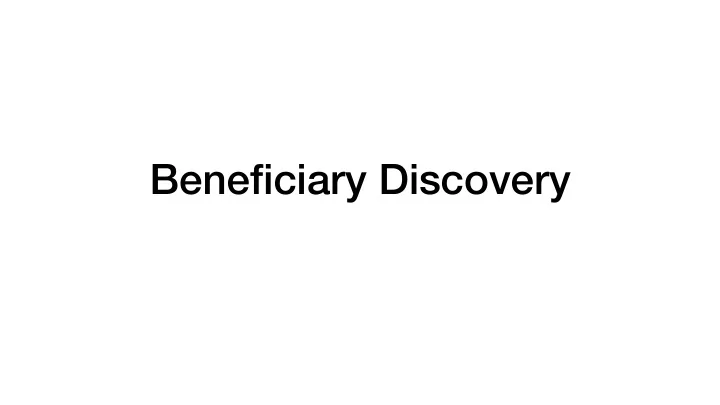

Beneficiary Discovery
How to win • Talk to a lot of beneficiaries • Ask the right questions • Take good notes
How to win • Talk to a lot of beneficiaries • Ask the right questions • Take good notes
Interview Tips • 1 question can often be enough to get everything you need • Don’t say anything — long pauses, but stay engaged • The interview is about them, and their knowledge • The less you say during the interview, the better (after establishing rapport) • It will not feel right at first • Look for emotions, pull out more • Ask for specific instances — avoid composites, or future — help participants re- create specific instances • If you focus on pain points, you can miss the larger problems —the bigger opportunity may come from understanding why — how did we get here?
Start with a standard intro Hi ______, thanks for jumping on the call. My name is ______, and I’ll be conducting the interview today. My colleague _____ is also on the line, taking notes. We’re a team of Stanford students doing some research with *PROBLEM SPONSOR*, to better understand *THE PROBLEM SUMMARY*. The calendar event we sent ends at 3:30, does that time still work as a stopping point? ——————— If you feel uncomfortable answering any of the questions or the answer is classified, just let me know and we can skip it. We’ve got a ton of questions, is it ok to get started?
“Questions you need to answer ” ≠ “Questions you need to ask ”
Don’t ask leading questions. • Leading Question: “How angry do you usually feel when a repair request fails to go through successfully?” • Non-leading Question: “Recall a time when a repair request failed to go through successfully. How did you feel?”
Ask about specific incidents in the past, when possible. • Speculative Question Based on Imagination: “Tell me what goes on in your head when a repair request fails to go through successfully.” • Context-based Question Grounded in Reality: “Tell me what went on in your head the last time a repair request failed to go through successfully.”
Ask more open-ended questions. • Specific Question: “What was the last repair request you submitted?” • Open-ended Question: “Tell me more about the last time you submitted a repair request.”
Don’t be afraid to just ask “Why?”
Close with, “Can you recommend anyone else we should talk to?”
Learn more: talkingtohumans.com
Learn more: realstartupbook.com
How to win • Talk to a lot of beneficiaries • Ask the right questions • Take good notes
Progressive Summarization A Practical Technique for Designing Discoverable Notes
Tiago Forte fortelabs.co
Designing discoverable notes • Future You doesn’t necessarily trust that everything Past You put into your notes is valuable.
Use resonance as your criteria
5% 10% 20% 100%
Learn more: fortelabs.co
How to win • Talk to a lot of beneficiaries • Ask the right questions • Take good notes
Recommend
More recommend